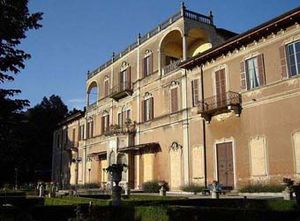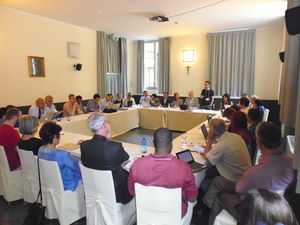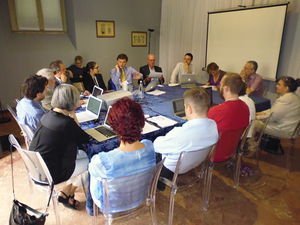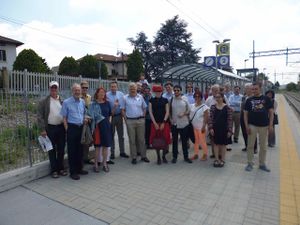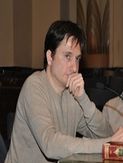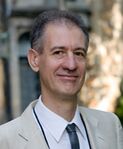Early Islam: The Sectarian Milieu of Late Antiquity? / 4th Nangeroni Meeting (2015 Milan), conference
Early Islam: The Sectarian Milieu of Late Antiquity? (2015) is the topic of the fourth conference in the series of Nangeroni Meetings, and the first conference of the Early Islamic Studies Seminar, organized by the Enoch Seminar in Milan, Italy (June 2015) in collaboration with COREIS.
< 1st (Milan 2012) -- 2nd (Israel 2014) -- 3rd (Rome 2014) -- 4th (Milan 2015) -- 5th (Naples 2015) -- 6th (Camaldoli 2016) -- 7th (Rome 2016) -- 8th (Florence 2017) -- 9th (Milan 2018) -- 10th (Rome 2018) >
Fourth Nangeroni Meeting (Milan, Italy; June 15–19, 2015)
Chair: Guillaume Dye (Free University of Brussels [ULB], Belgium, EU)
Co-Chair: Gabriele Boccaccini (University of Michigan, USA / Enoch Seminar)
Secretary: Rodney Caruthers (University of Michigan, USA / Enoch Seminar)
Preliminary Information
When: June 15-19, 2015
Accommodations: Villa Cagnola (Gazzada Schianno, Milan, Italy)
Location of the Seminar: Villa Cagnola (Gazzada Schianno, Milan, Italy)
Purpose: The meeting aims at examining afresh formative Islam in its the late-antique context. We plan to have panels (major sessions) on the following topics:
- Early Islam and Enochic Traditions
- The Making of the Islamic Prophet
- How Should We Interpret the Early Islamic Account of the Arab Conquests?
- The Biblia Arabica Project
- Epigraphic Sources for the Study of Qur'ānic Origins
- The Qur'ān in Light of Redaction Criticism
- Method and Theory in the Study of Islamic Origins
Major papers will be offered by Annette Yoshiko Reed, Carlos A. Segovia, Emilio González Ferrín, Meira Polliack, Guillaume Dye, Manfred Kropp, and Stephen J. Shoemaker.
Short papers on Qur'ānic and Early Islamic Studies will be welcome, particularly if they are related to any of the following topics of interest, to which we plan to devote several reading sessions and short-paper sessions, as well:
- Arabia, Byzantium, and Persia on the Eve of Islam
- Scribal Culture in the Near East (6th-8th centuries)
- Biblical/Para-Biblical Traditions in the Qur’ān
- Dating Old Qur'ānic Manuscripts: Problems, Methods, Criteria
- The Material Culture of Emergent Islam
The pre-circulating papers shall be presented briefly (5 min.) before being discussed by the participants (respondents will be allowed 10 min. to respond before the general discussion begins).
Paper Submission: All papers should be submitted by May 30, 2015. This will allow respondents and other participants enough time to prepare their responses and critical comments.
Paper Length: Major papers should be 6,000 words maximum; short papers, 3,000 words maximum.
Prospective Publication: A volume will be published with a selection of the papers offered atf the conference, which overall purpose is to contribute to the renewed study of Islamic origins in close dialogue with scholars working on the late-antique Near East, Second Temple Judaism, Rabbinic Judaism, early Christianity, and Sassanian Iran.
Participation in the Early Islamic Studies Seminar is by invitation only.
Should you like to present a short paper, please send to the chair of the conference, Guillaume Dye (gdye@noos.fr), by May 2015.
Should you simply like to attend the conference, or receive further information about it, please contact its secretary, Rodney Caruthers (rodneyac@umich.edu) at your earliest convenience.
Accommodations
We have secured the lovely Villa Cagnola in Gazzada Schianno (about 45 kilometres [28 miles] northwest of Milan) for our accommodations. Four nights lodging and all breakfasts and lunches are included in the cost, paid directly to us in Milan via cash:
- €0 – Authors of Major Papers
- €200 – Major Paper Respondents
- €300 – Everyone else
- €200 – Guests (children under 14, staying in the same room, are free)
Registration
Participation in the Fourth Nangeroni Meeting is by invitation only. If you have already secured your participation, please fill out the official online registration form and pay your registration fee by February 28, 2015.
The registration fee is based on the number of Enoch Seminars/Nangeroni Meetings you have attended in the past:
- $125 – Newcomers
- $110 – Attended 1 Enoch Seminar
- $100 – Attended 2 Enoch Seminars
- $90 – Attended 3 Enoch Seminars
- $75 – Attended 4 or 5 Enoch Seminars + all emeriti
- $0 – Attended 6 or more Enoch Seminars or Nangeroni Meetings
This registration fee is a donation to our sponsor, the Michigan Center for Early Christian Studies, and it is tax-deductible for U.S. residents. The registration fee is refundable (minus a $50 administrative processing fee) 30 days prior to the start of the Seminar (i.e. by May 15, 2015) if for some reason you are unable to attend.
Participants
- Aghaei, Ali (Corpus Coranicum, Berlin-Brandenburg Academy of Sciences and Humanities, Germany, EU)*
- Azaiez, Mehdi (Catholic University of Leuven, Belgium, EU)*
- Benassi, 'Isa 'Abd al-Haqq Nicola (COREIS, Italy, EU)*
- Boccaccini, Gabriele (University of Michigan, USA / Enoch Seminar)*
- Bonner, Michael (University of Michigan, USA)*
- Bori, Caterina (University of Bologna, Italy, EU)*
- Borrut, Antoine (University of Maryland, USA)*
- Caruthers, Rodney (University of Michigan, USA / Enoch Seminar)*
- Courtieu, Gilles (Jean Moulin University Lyon 3, France, EU)*
- Dye, Guillaume (Free University of Brussels [ULB], Belgium, EU)*
- Enriello, Laura Mulayka (Interreligious Studies Academy, Italy, EU)*
- Fedeli, Alba (University of Birmingham, England, UK, EU)*
- Fisher, Greg (Carleton University, Ontario, Canada)*
- González Ferrín, Emilio (University of Seville, Spain, EU)*
- Hoffman, Thomas (University of Copenhagen, Denmark)*
- Holcátová, Barbara Kateřina Oudová (Charles University, Prague, Czech Republic, EU)
- Kropp, Manfred (Johannes Gutenberg University of Mainz, Germany, EU)*
- Mårtensson, Ulrika (Norwegian University of Science and Technology, Norway)*
- Morris, Ian D. (Spanish National Research Council [CSIC], Spain, EU / University of Amsterdam, Netherlands, EU)*
- Mortensen, Mette Bjerregaard (Aarhus University, Denmark, EU)*
- Neuenkirchen, Paul (École Pratique des Hautes Études [EPHE], France, EU)*
- Oliver, Isaac W. (Bradley University, Illinois, USA / Enoch Seminar)*
- Pagani, Samuela (University of Salento, Italy, EU)*
- Palombo, Cecilia (Princeton University, USA)
- Petersen, Anders Klostergaard (Aarhus University, Denmark, EU / Enoch Seminar)*
- Pohlmann, Karl-Friedrich (University of Münster, Germany, EU)*
- Polliack, Meira (Tel Aviv University, Israel)*
- Pourshariati, Parvaneh (New York City College of Technology, USA)*
- Powers, David S. (Cornell University, New York, USA)*
- Reed, Annette Yoshiko (University of Pennsylvania, USA / Enoch Seminar)*
- Retsö, Jan (University of Gothenburg, Sweden, EU)*
- Segovia, Carlos A. (Saint Louis University, Spain, EU / Enoch Seminar)*
- Shoemaker, Stephen J. (University of Oregon, USA)*
- Swanson, Dwight (Nazarene Theological College Manchester, UK, EU)*
- Watson, Francis (Durham University, UK, EU)*
- Wilk, Mateusz (University of Warsaw, Poland, EU)*
- Wood, Philip (The Aga Khan University, England, UK, EU)*
Provisional Schedule
Monday, June 15––––––––––––––––––––––––––––––––––––––––––––––––––––––––––––––––––––––––––––––––––––––––––––
08:00-16:00 – Arrivals
17:00 – Opening Session and Welcome (Gabriele Boccaccini, Guillaume Dye)
17:45–19:30 – Session 1: EARLY ISLAM AND ENOCHIC TRADITIONS
- Annette Yoshiko Reed, "Fallen Angels and the Afterlives of Enochic Traditions in Early Islam"; Respondent: Carlos A. Segovia
20:00 - Dinner
Tuesday, June 16––––––––––––––––––––––––––––––––––––––––––––––––––––––––––––––––––––––––––––––––––––––––––––
09:00–10:15 – Reading Sessions
- (a) Eschatological Counter-Discourse in the Qur'ān and Tractate Sanhedrîn
- Chair: Mehdi Azaiez
- (b) Christian Representations of the Coming of Islam
- Chair: Philip Wood
10:45–12:30 – Session 2: THE MAKING OF THE ISLAMIC PROPHET
- Carlos A. Segovia, "A Messianic Controversy behind the Making of Muḥammad as the Last Prophet?"; Respondent: David S. Powers
13:00 - Lunch - - - - - - - - - - - - - - - - - - - - - - - - - - - - - - - - - - - - - - - - - - - - - - - - - - - - - - - - - - - - - - - - - - - - - - - - - - - - - - - - - - - - - - -
14:30–16:15 – Session 3: HOW SHOULD WE INTERPRET THE EARLY ISLAMIC ACCOUNT OF THE ARAB CONQUESTS?
- Emilio González Ferrín, "Islamic Late Antiquity and Fatḥ: The Effect as Cause"; Respondent: Antoine Borrut
16:45–18:15 – Short Papers
- The Political and Religious Context of Islamic Late Antiquity (Chair: Caterina Bori)
- Greg Fisher, "Arabia and the Late Antique East: Current Research and New Problems"
- Ian D. Morris, "The Arabian Origins of the Ḥāǧib: From Household Servant to Courtly Officer"
- Parvaneh Pourshariati, "In Search of Religious 'Orthodoxy' in Sasanian Iran: The Paradigm and Its Devotees"
- Philip Wood, "Archival Authority in the 'Abbāsid Caliphate: Edessa and Its Tax Claims"
20:00 - Dinner
Wednesday, June 17–––––––––––––––––––––––––––––––––––––––––––––––––––––––––––––––––––––––––––––––––––––––––
08:45–10:15 – Short Papers
- The History of the Qur'ān: New Perspectives and Debates (Chair: Anders Klostergaard Petersen)
- Karl-Friedrich Pohlmann, "Conversion from Jewish and Christian Milieus to Islam and Its Influence on the Formation of the Qur'ān"
- Ulrika Mårtensson, "Al-Ṭabarī's Accounts of Islam and the Qur'ān: Methodological Implications for Research on Manuscripts, Linguistics, and the Qur'ān"
- Alba Fedeli, "Is the Dating of Qur'ānic Manuscripts Still a Problem?"
- Paul Neuenkirchen, "Eschatology, Responsories and Rubrics in Eastern Christian Liturgies and the Qur'ān: Some Preliminary Remarks"
10:45–12:30 – Session 4: EPIGRAPHIC SOURCES FOR THE STUDY OF QUR'ĀNIC ORIGINS
- Manfred Kropp, "Epigraphical Sources in the Arabian Peninsula and Adjacent Regions in Late Antiquity: Their Relevance for Research on the Origins of the Qur'ān and Early Islam"; Respondent: Jan Retsö
13:00 - Lunch - - - - - - - - - - - - - - - - - - - - - - - - - - - - - - - - - - - - - - - - - - - - - - - - - - - - - - - - - - - - - - - - - - - - - - - - - - - - - - - - - - - - - - -
Optional cultural visit to Milan and the Ambrosian Library
Thursday, June 18–––––––––––––––––––––––––––––––––––––––––––––––––––––––––––––––––––––––––––––––––––––––––––
09:00–10:15 – Short Papers
- (a) Biblical/Para-Biblical Traditions in the Qur'ān (Chair: Gabriele Boccaccini)
- Ali Aghaei, "God commands you to slaughter a Cow: Q. 2:67-74 as an allusion to Num. 19:1-19 or Deut. 21:1-9?"
- Francis Watson, "Abraham the Iconoclast in Qur'ānic Transformation"
- 'Isa 'Abd al-Haqq Nicola Benassi, "Muḥammad and the Christian Monks Baḥīrā and Waraqa: Revelation and Dialogue at the Origin of the Qur'ān"
- Laura Mulayka Enriello, "Qur'ān and Eschatology: Reflections on the Prophet Enoch in the Islamic Tradition"
- (b) Qur'ānic- and Early Islamic Eschatology (Chair: Mette Bjerregaard Mortensen)
- Thomas Hoffmann, "Eruptions of Memories: On Collective Memory and Seismic Catastrophe in the Qur’ān"
- Gilles Courtieu, "Cushions, Bottles and Roast Chickens! More Advertising about Paradise"
- Mateusz Wilk, "Religious Scrupulousness and the End of the World: Some Remarks on Early Islamic Piety"
10:45–12:30 – Session 5: THE BIBLIA ARABICA PROJECT
- Meira Polliack, "The Task of Translation: Reflections on a Recent Scholarly Project"; Respondent: Guillaume Dye
13:00 - Lunch - - - - - - - - - - - - - - - - - - - - - - - - - - - - - - - - - - - - - - - - - - - - - - - - - - - - - - - - - - - - - - - - - - - - - - - - - - - - - - - - - - - - - -
14:30–16:15 – Session 6: THE QUR'ĀN FROM THE POINT OF VIEW OF REDACTION CRITICISM
- Guillaume Dye, "The Qur'ān and Its Hypertextuality in Light of Redaction Criticism"; Respondent: Isaac W. Oliver
20:00 - Dinner
Friday, June 19–––––––––––––––––––––––––––––––––––––––––––––––––––––––––––––––––––––––––––––––––––––––––––––
09:00–10:45 – Session 7: METHOD AND THEORY IN THE STUDY OF ISLAMIC ORIGINS
- Stephen J. Shoemaker, "Method and Theory in the Study of Early Islam"; Respondent: Anders Klostergaard Petersen
11:15–12:30 – Closing Plenary Session
13:00 – Lunch & Farewells
––––––––––––––––––––––––––––––––––––––––––––––––––––––––––––––––––––––––––––––––––––––––––––––––––––––––––––
Getting to the Seminar
Villa Cagnola (main lodging and location of Seminar):
Istituto Superiore di Studi Religiosi “Villa Cagnola”
Via Cagnola, 17/19
21045 GAZZADA SCHIANNO (VA)
Tel. +39 0332 461304
fax +39 0332 870887
E-mail: reception@villacagnola.it
villacagnola@tin.it
From Malpensa Airport
Taxi: 25-30 minutes; ~60 Euros
Train: ~1.5 hours; ~6 Euros (See trenitalia.com, Departure = "Malpensa Aeroporto" Arrival = "Gazzada-Schianno-Morazzone")
- Take bus from Malpensa to "Busto Arsizio” and from there take a train “Suburbano” to the stop “Gazzada-Schianno.”
- The station in Gazzada is about 1km from the Villa, or ~200m via the steps (see map).
From Milan via Train
There are no direct trips to Gazzada from Milano Centrale station (though it is usually a quick connection). Most of the direct trips from Milan are from the Milano Porta Girabaldi station (which is also in the center of town). Visit trenitalia.com to find the best times for direct trips. For departure, select "Milano (all stations)," and for arrival, "Gazzada-Schianno-Morazzone." This will show you all of the trips to Gazzada from the Milan stations. The trip will take 1-1.5 hours and cost around 6 euros.
From Linate
Taxi: Cost - ?? (probably extremely high); There is a shuttle which runs from Linate to Malpensa where you could share a taxi with those arriving at Malpensa.
Train: Take shuttle or bus to Milano Centrale station (see above).
